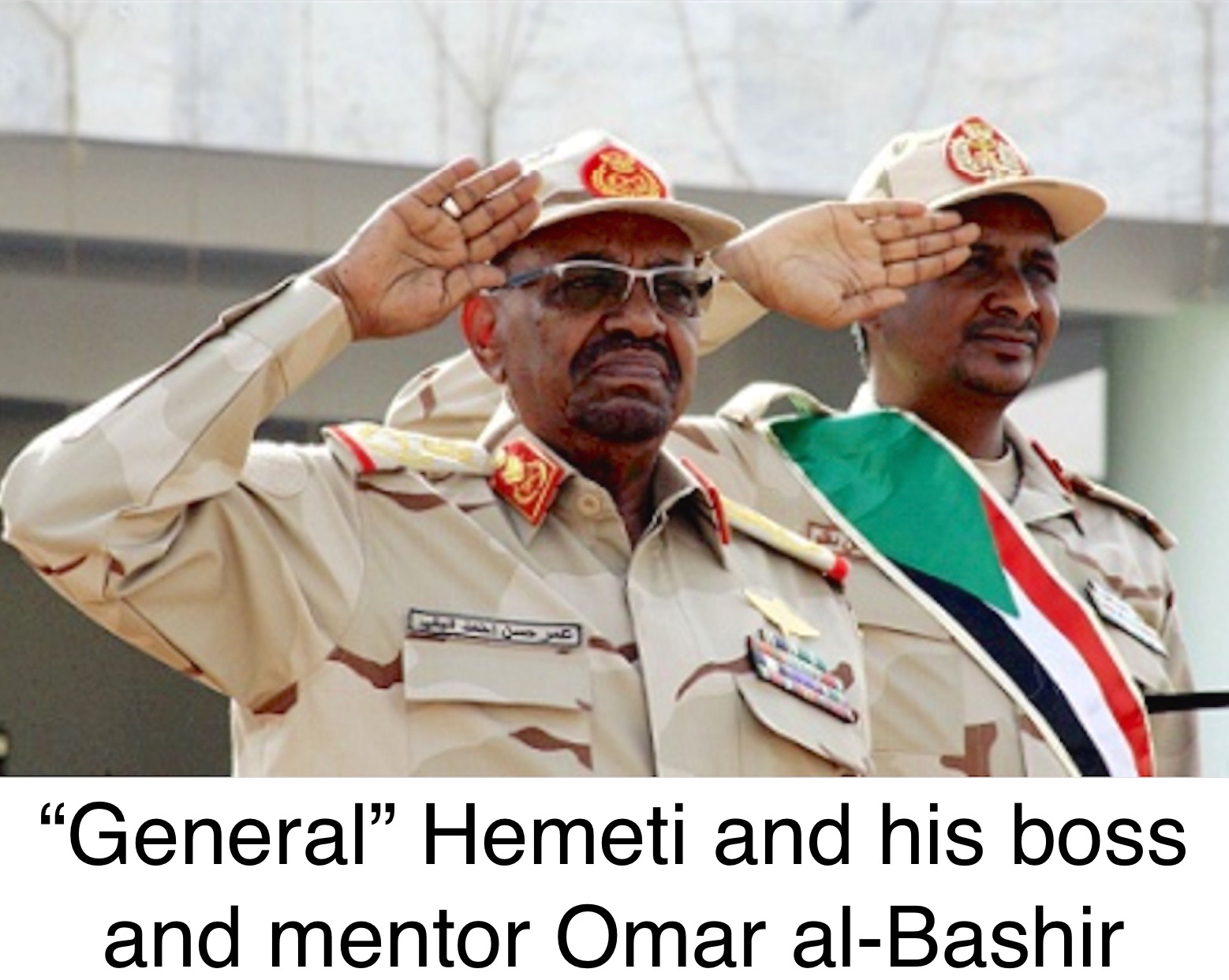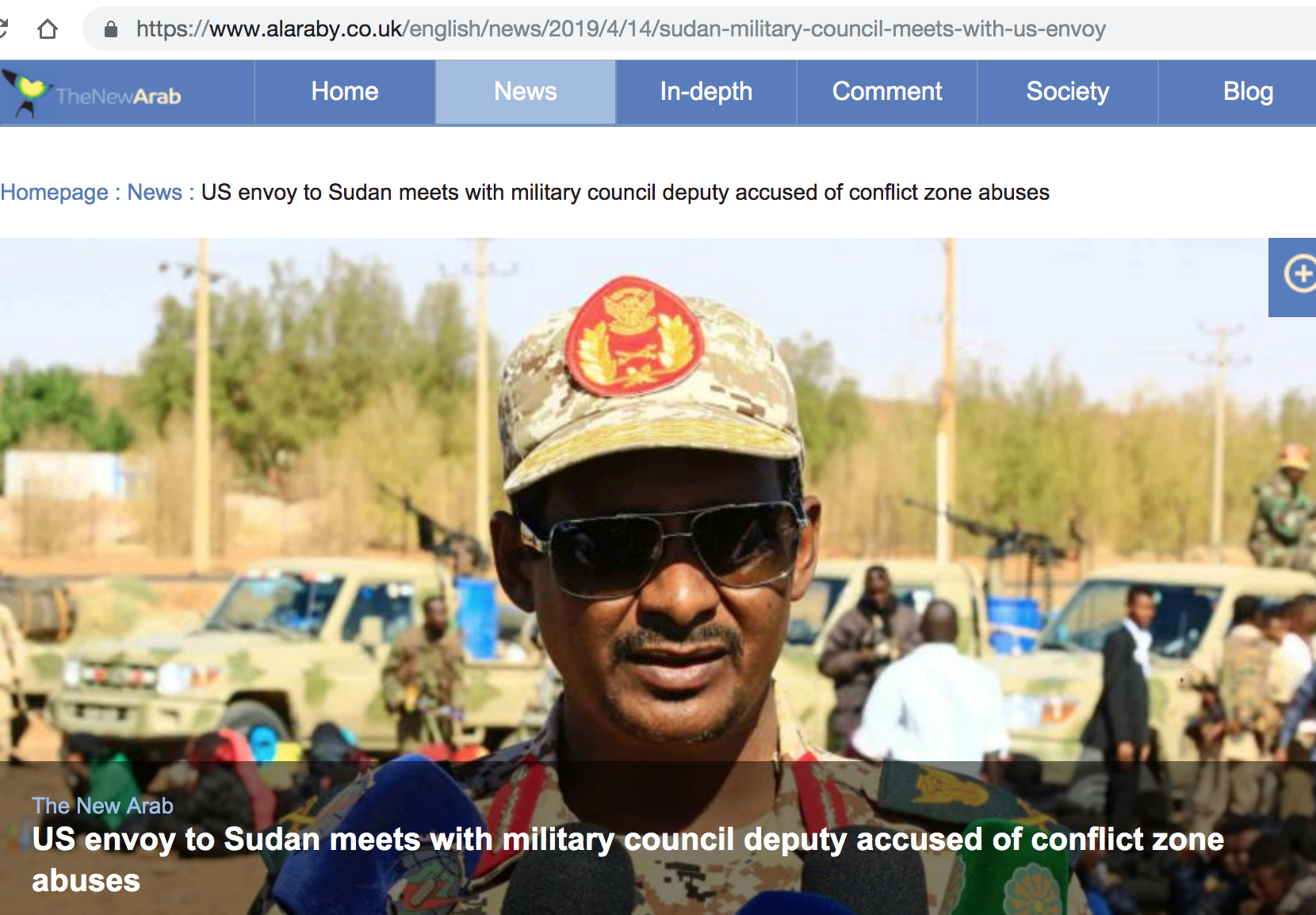My Interview on CNN International (television), April 15, 2019
Eric Reeves | April 15, 2019 | https://wp.me/p45rOG-2oV
I was asked by CNN International television to address the following questions, some at my suggestion. The interview can be found at |
https://drive.google.com/a/smith.edu/file/d/1SbXTCShaamHZjYL2AnhcNNpIgfDuj8Zm/view?usp=drive_web
Overview of commentary:
What do we know about General Abdel Fatah al-Burhan, now head of the military council?
He is the Army Inspector General and commanded Sudanese army forces (SAF) fighting with Saudi Arabia in Yemen, along with his new “Vice President,” Lt. General Mohamed Hamdan Dagolo (more commonly known as Hemeti), commander of the Rapid Support Forces (RSF), or the “new Janjaweed.”
Who is “Hemeti”?
He is commander of the Rapid Support Forces, including between the years 2013 – 2016, some of the most violent and destructive in the Darfur genocide. He will certainly be indicted by the International Criminal Court if the military council gives way to civilian governance in Sudan. The charges will be genocide and massive crimes against humanity—and everyone in Sudan, both on the civilian and military sides, is well aware of this. Some attempts have been made to whitewash his past and to suggest he has been rehabilitated. This is gross mendacity.
See |
“Scorched Earth, Poisoned Air: Sudanese Government Forces Ravage Jebel Marra, Darfur,” Amnesty International, September 26, 2016 | https://www.amnestyusa.org/reports/scorched-earth-poisoned-air-sudanese-government-forces-ravage-jebel-marra-darfur
“Men With No Mercy”: Rapid Support Forces Attacks Against Civilians in Darfur, Sudan,” Human Rights Watch, September 9, 2015 | https://www.hrw.org/report/2015/09/09/men-no-mercy/rapid-support-forces-attacks-against-civilians-darfur-sudan
“‘Changing the Demography”: Violent Expropriation and Destruction of Farmlands in Darfur, November 2014 – November 2015” | December 2015 | Eric Reeves, author | Maya Baca, research and editing—includes framing analysis, extensive data spreadsheet covering all reported incidents of violence against farmers and farmland in Darfur, as well as a detailed mapping of these data onto three maps encompassing all of Darfur | http://wp.me/p45rOG-1P4
“Continuing Mass Rape of Girls in Darfur: The most heinous crime generates no international outrage” | January 2016 | Eric Reeves, author| Maya Baca, research and editing—includes framing analysis, extensive data spreadsheet for 2014 and 2015, as well as detailed mapping of these data onto three maps encompassing all of Darfur | http://wp.me/p45rOG-1QG (monograph translated into Arabic | http://wp.me/p45rOG-1Rr/)
What will be the reaction of the people of Sudan in the uprising to Hemeti’s appointment, a man who is known for his genocidal campaigns in Darfur, especially North and Central Darfur, 2013 – 2016 and beyond? How will the people of Darfur respond?
On Sudanese social media, the reaction against Hemeti is very strong, especially among Darfuris, but also the leadership of the Sudanese Professionals Association (SPA), which has provide the key leadership in the uprising.
Hemeti is known to have deployed child soldiers in Yemen as part of his RSF “expeditionary force.” We also know that war-making in Yemen, as conducted by the Saudis, with Khartoum’s assistance (and that of the U.S.) by its very nature entails systematic war crimes and crimes against humanity. The denial of humanitarian access as supported by Hemeti and al-Burham amounts to a crime against humanity (see my argument on this issue in African Studies, December 2011 | http://wp.me/p45rOG-I6/).
What do we know of Hemeti’s time in Yemen along with new head of military council, General Abdel Fatah al-Burhan? Could Hemeti implicate al-Burhan in war crimes, which are the very definition of Saudi Arabia’s conduct of war in Yemen? Could he engage in blackmail—or threaten to loose his RSF forces in Darfur and South Kordofan if the doesn’t get the power arrangement he wants, and the number two position for himself?
We need to know a good deal more about these questions, which are largely unanswered at present.
The appointment of Hemeti is the most disturbing development of the last couple of days, and we need to know why General Abdel Fatah al-Burhan would appoint him to such a conspicuous position.
The decision by the senior U.S. diplomat in Khartoum, Steven Koutsis, to meet Sunday with Hemeti was obscenely inappropriate.

